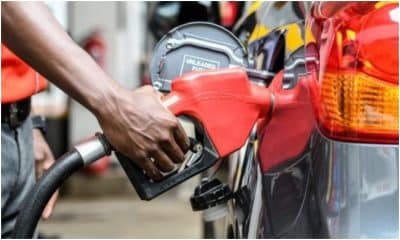Nigeria News
How Safe Is Converting Generator From Petrol To Gas? [Read This]
![How Safe Is Converting Generator From Petrol To Gas? [Read This]](https://www.naijanews.com/wp-content/uploads/2023/08/Gas-and-gen.png)
They are prone to explosion if not well maintained and monitored, says a Mechanical Engineer in Ogun State, Kolawole Ogunwemimo, who shared his expertise with journalists on the recent trend of using Liquefied Petroleum Gas (LPG) to power generator sets instead of the traditional premium motor spirit (PMS) also known as fuel or petrol.
Naija News reports that Nigerians recently adopted the use of gas to power their generator sets following the removal of fuel subsidy, which resulted in a hike in the price of petrol per litre.
Recall that President Bola Ahmed Tinubu, during his inaugural speech on May 29, declared that the government can no longer sustain the payment of subsidy on the widely used commodity.
The government’s decision, however, has caused untold hardship for the citizens as the price of petrol, which usually sells on average of N200, now sells at a price above N600 per little.
In what many considered innovative, Nigerians have now resorted to abandoning the traditional use of petrol to adopt gas as their new source to power their generators.
There have been concerns, however, about the latest innovation, which is considered cheap.
Speaking to Daily Post on the recent trend, Engineer Ogunwemimo said: “Leakages in Liquefied Petroleum Gas, LPG, are not easily noticed and are prone to explosion if not well handled and maintained.”
The expert explained further that “A converted petrol engine to LPG will have less efficiency because it was not originally designed for such fuel compared to an engine that is designed for such, though it might be more cost-effective than PMS.
“We must emphasise that they are prone to explosion if not well maintained and monitored. This is where the government should come in and enlighten the masses.”
Fuel Subsidy Woes, Power Issues In Nigeria
Naija News reports that the hike in fuel prices has affected the cost of transportation, as well as both tangible and intangible goods.
Unfortunately, while the government is looking for ways to reduce the cost of transportation through the conversion of petrol buses to ones that could use Compressed Natural Gas (CNG), the authorities seem to have paid no attention to electricity power generators.
Nigeria, as a nation, is still suffering from power problems. The nation has the lowest access to electricity globally, with about 92 million persons out of the country’s 200 million population lacking access to power, according to the Energy Progress Report 2022, released by Tracking SDG 7.
The report, produced in conjunction with the International Energy Agency, International Renewable Energy Agency, United Nations Statistics Division, the World Bank and the World Health Organisation, indicated that Nigeria was followed by the Democratic Republic of Congo’s 72 million, Ethiopia’s 56 million and Pakistan’s 54 million access deficits.
Power Grid Collapse: Nigerians Seeking Alternatives
Over the years, there have been reports that the nation’s power grids collapsed at regular intervals, leaving the few powered communities in darkness for many days.
To enjoy electricity in their homes, Nigerians resort to alternative power sources, the cheapest of which is the use of power generators of different sizes. Before now, people run their generators with petrol.
However, due to the obvious hike in the price of petrol and the economic crisis in the country, the citizens now make every attempt to beat the amount of money spent on petrol.
Converting Fuel Generator To Gas
Findings have revealed that the first step in converting a fuel generator to gas is to change the petrol carburettor.
Carburettor: This is a device for supplying a spark-ignition engine with a mixture of fuel and air.
According to experts, the original carburettor of a generator is now replaced with a carburettor that uses gas, after which a gas cylinder and a long hose are connected.
The carburettor will be connected to the cylinder with the hose, from where it gets its new fuel. This means the tank of the generator has been rendered useless, but some said the carburettor could be used interchangeably for either gas or petrol.
The use of gas for generators is said to have started as far back as 2014. However, only a very insignificant number of people accepted the innovation.
The recent high cost of petrol, however, is now forcing many to adopt the initiative. Apart from saving money, it has been said that the use of gas in powering generators reduces the emission of carbon monoxide and makes the engine last longer. It saves the environment and minimises the risk of inhaling fumes.
Despite the positive remarks on the innovation, members of the public are still very sceptical about the safety of running their generators with gas. Many are scared that there could be explosions and have decided not to convert their gasoline generators.
There is, however, the need for the government to look into the new development so as to inform the citizens of their best decision.
One Barr. Kehinde Bamiwola, who also reportedly spoke to Daily Post on the latest innovation said he had converted his generator from petrol to gas over a month ago.
According to him, he now saves half of what he usually spends on petrol daily for his 6KVa generator.
Bamiwola said he understands the concern for safety, noting, however, that the same gas used for cooking with flames in the kitchen could not become more dangerous when being used with generators outdoors.
Sulaimon Babatunde, a resident of Abeokuta, described it as safe and economical when he said: “It’s very safe and affordable, that’s what I have been using since five days ago, and my 12kg gas has never finished.”
So far, the testimonies of those who are using LNG for their power generators have shown that they have been able to reduce what they usually spend in fueling their power generators, but the questions about safety remain unanswered by those who should know.
Amid this discussion, some have suggested that Nigerians should embrace solar as their alternative source of energy, while they also call on the government to overhaul the power sector and save Nigerians from the hazards in seeking alternative power supply.










